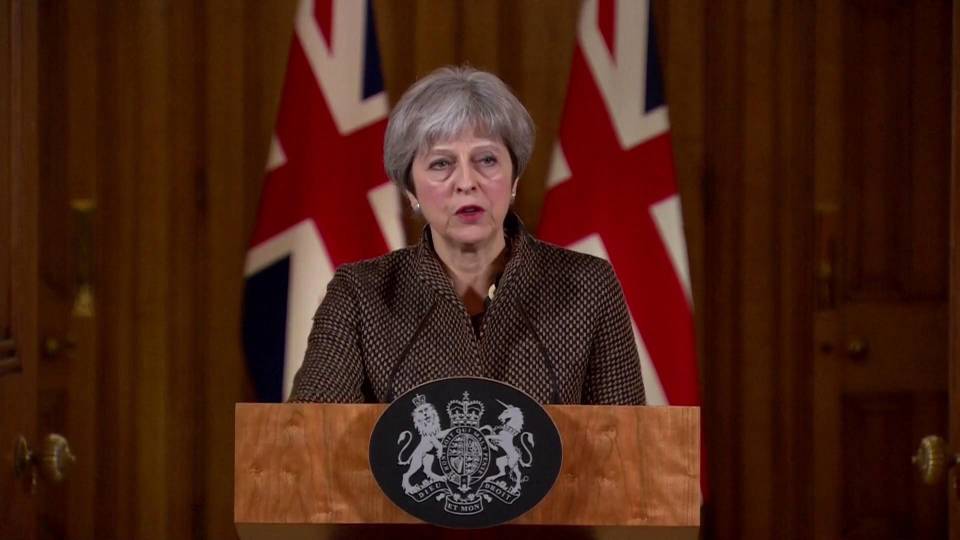For British and French Leaders, Political Battle Shifts to Home Ground After Syria Strikes
The leaders of France and Britain used phrases such as “red line” and “horrific suffering” on Saturday to defend their decisions to join the U.S.-led strike against Syria for its suspected chemical attack.
France and Britain on Saturday stressed that their military response was limited, successful and not designed to topple the regime of Bashar al-Assad. The goal at home, meanwhile, was to soften the political fallout amid questions and clamor over taking part in the military action led by President Trump.
The moves by British Prime Minister Theresa May and French President Emmanuel Macron are unlikely to pose direct threats to the stability of their respective governments. But Saturday’s blowback over the allies’ coordinated attacks in Syria is playing differently in Europe than America.
In Britain, it was an open question: How much did the public support May’s decision to bomb Syrian targets? Many in Britain are still upset over former prime minister Tony Blair’s decision to join George W. Bush in the Iraq War, claiming the country was misled and that the results were disastrous.
In France, Macron has a similar uphill climb to win over a public highly cautious about getting too involved in another Middle East crisis as the memory of a Libyan operation in 2011 still looms large. French forces, along with NATO allies, toppled the regime of the late dictator Moammar Gaddafi but ultimately entered a conflict that dragged on for months longer than anticipated.
“We have seen harrowing images of men, women and children lying dead with foam in their mouths,” May said during a news conference at 10 Downing Street. Referring to the Syrian regime, she said: “We are also clear about who was responsible for this atrocity.”
Yet her opponents pounced — sensing a deep skepticism in Britain over whether military action was the right course, or that May did not go about it in the preferred way.
Jeremy Corbyn, the leader of the opposition Labour Party, has said that Britain should not be “taking instructions from Washington and putting British military personnel in harm’s way.”
“Bombs won’t save lives or bring about peace,” he said in a post on his Facebook page. “This legally questionable action risks escalating further.”
Vince Cable, the leader of the Liberal Democrats, didn’t rule out supporting military action if a case were made but said that May was wrong not to get parliamentary consent.
“Riding the coattails of an erratic U.S. president is no substitute for a mandate from the House of Commons,” he said.
“Air strikes have not resolved situation in Syria so far — nothing I’ve heard persuades me they will do so now,” tweeted Nicola Sturgeon, the first minister of Scotland.
“UK foreign policy should be set by Parliament, not US President,” she added.
May is not required by law to win approval from lawmakers before committing Britain to military action. But the convention in Britain is that lawmakers be given the chance to vote. Parliament is in recess until Monday, but May could have called an emergency session.
When she was asked why she didn’t seek Parliament’s consent, May suggested speed was essential. “For operational security reasons, it was right that we acted the way we did,” she said.
It is unclear how such a vote in Parliament would have turned out. The 2003 Iraq War casts a long shadow over politics in Britain, and some lawmakers are wary about the effectiveness of military action on its own.
In 2013, David Cameron, then the prime minister, lost a vote in Parliament that was designed to pave the way for airstrikes against the Assad regime. Two years later, he won a vote for Britain to join the U.S.-led bombing campaign that targeted the Islamic State in Syria.
In France, Macron faced a skeptical public, but one that was willing to give the president some leeway.
“Because we don’t have an Iraq problem in France, people tend to trust the executive on this,” said François Heisbourg, a security analyst and former presidential national security adviser in an interview.
Macron, who has long considered the use of chemical weapons in Syria “a red line,” was clear to underscore what he presented as France’s moral obligation to intervene.
“We cannot tolerate the normalization of the employment of chemical weapons, which is an immediate danger to the Syrian people and to our collective security,” Macron said in a statement on Saturday.
According to French defense officials, 12 French missiles were fired in total. British Defense Minister Gavin Williamson said four Royal Air Force Tornado GR4 jets took part in the strikes. He told BBC Radio that initial assessments suggest it was “a highly successful mission.”
In the days leading up to the strike, opinion polls suggested the French public was skeptical about the prospect of an attack.
But former president François Hollande and Benoît Hamon, the Socialist contender for the French presidency last year, came to Macron’s defense in the last week, urging an end to humanitarian abuses in Syria.
The loudest opposition in France was ultimately confined to the political extremes, factions with little clout in parliament.
“It’s a North American revenge adventure, an irresponsible escalation,” said Jean-Luc Mélénchon, the leader of the far-left France Unbowed party. “France deserves better than this role. It must be the force of international order and peace.” Marine Le Pen, the leader of the far-right National Front, said much the same.
Macron and Parly emphasized the limited scope of Saturday’s strikes.
“The targets were chosen precisely: These are the sites themselves that permitted the massacre of Syrian women and children in defiance of all the norms of law, in defiance of all norms of humanity,” said France’s defense minister, Florence Parly.






















